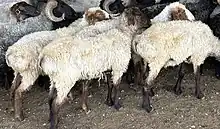Saryja sheep
Saryja (also: Saraja; Turkmen: saryja goýuny) is a breed of fat-tailed sheep developed on the territory of Turkmenistan. The breed was developed through a long-term selection of Turkmen breeds of fat-tailed sheep, which had a high content of fluff in wool. The breed received its name from the village of Saryja, located near the Turkmen city of Mary.[1]
| Country of origin | Turkmenistan |
|---|---|
| |

About the breed
Sheep of the Saryja breed are usually white in color, while the legs and head are red. The musculature is poorly developed, and the coat is semi-coarse and shiny, contains a lot of fluff and contains almost no dead hair. Fleece is of braid structure, the length of braids is 13–18 cm and the fluff is 6–9 cm.[2]
The weight of an adult sheep is on average from 50 to 60 kg, the largest individuals reach 75 kg, the average weight of a ram is from 80 to 90 kg, and the largest reach 100 kg or more.[3]
Saryja sheep are hardy and well adapted to year-round keeping on pastures and with limited feeding in winter. It is considered one of the best fat-tailed breeds of meat and tallow. With the help of breeding rams of the Saryja breed, such breed groups of sheep as Tajik and Karagaly were developed.[4]
In Turkmenistan, Saryja sheep are bred in the southern part of the central Karakum, as well as on the plains adjacent to the Kopetdag Range.[4] Also, sheep of Saryja breed are grown in Kazakhstan, Uzbekistan and Russia (Orenburg region and Altai).[1]
References
- Евгения Чернышова (2014-02-03). "Сараджинская порода овец". AgroXXI. Archived from the original on 2021-06-24. Retrieved 2021-06-22.
- Batyrov, Seyitguly (2004-08-01). "Turkmen Saryja Wool: Basic Characteristics". JOZAN. Retrieved 2023-06-29.
- Batyrov, Seyitguly (2004-08-01). "Turkmen Saryja Wool: Basic Characteristics". JOZAN. Retrieved 2023-06-29.
- Эрнст, Л.К.; Дмитриев, Н.Г.; Паронян, И.А. (1994). "Генетические ресурсы сельскохозяйственных животных в России и сопредельных странах". Санкт-Петербург: ВНИИГРЖ. Archived from the original on 2021-06-24. Retrieved 2021-06-23.